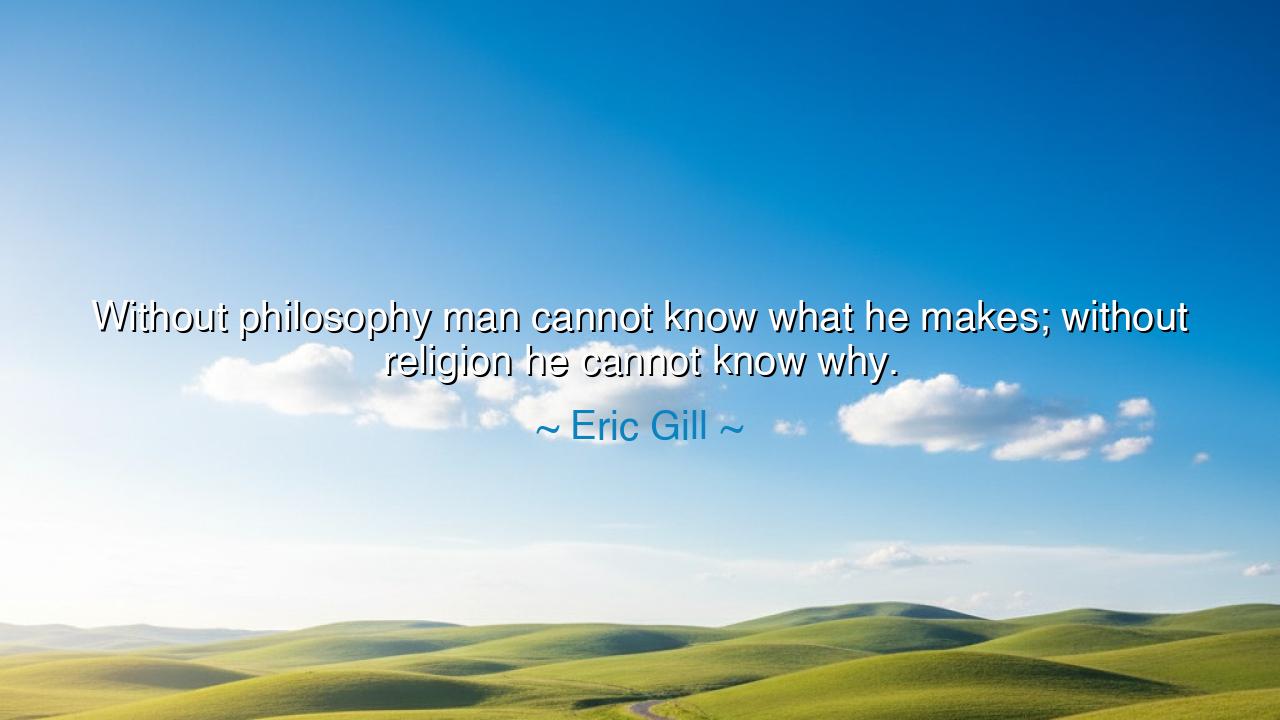
Without philosophy man cannot know what he makes; without






In the deep quiet of contemplation, the English artist and thinker Eric Gill once declared: “Without philosophy man cannot know what he makes; without religion he cannot know why.” These words, carved like stone in their clarity, speak to the two pillars upon which true human creation stands — understanding and purpose. For Gill saw that civilization, though adorned with invention and progress, risks becoming hollow if it forgets to ask two questions: What am I doing? and Why am I doing it? In this union of philosophy and religion, he found the map of meaning itself — the mind’s pursuit of truth joined with the soul’s longing for divine purpose.
The origin of this quote lies in Gill’s own life — a craftsman, sculptor, and visionary who lived at the crossing of art, intellect, and faith. In an age rushing toward industrialization, he lamented that man had learned to produce much but understand little. Machines could build faster, but men had ceased to think deeply about what they built or whom it served. To Gill, philosophy — the love of wisdom — was the discipline that revealed what we create, what it means, and how it shapes our existence. Yet even wisdom alone, he warned, was incomplete without the higher flame of religion, which teaches why we create — for what greater end, for whom, and toward what destiny. Without philosophy, man becomes a worker without comprehension; without religion, he becomes a creator without conscience.
Consider the builders of the cathedrals of Europe, those nameless artisans who raised stone to the heavens. They did not simply construct walls; they fashioned symbols of eternity. Their philosophy taught them proportion, harmony, and the laws of structure — but their religion gave their labor its soul. Each stone was laid not only by hand, but by faith. They worked not for wages alone, but for worship. Their craft was an offering — an act of love and awe toward the divine. In those soaring vaults and stained-glass windows, the mind and the spirit moved as one. This is what Gill meant: that creation without philosophy is blind, and creation without religion is empty.
When a society loses sight of this harmony, the results are visible everywhere. The modern age, with its machines, screens, and ceaseless production, often celebrates progress without purpose. We build faster, but not wiser; we invent endlessly, but rarely ask why. Our philosophy has become fragmented, our religion abandoned to the private corners of the heart. Thus, man becomes both powerful and lost — a maker of wonders who no longer understands the wonder of his own making. He knows how to split the atom, but not why he should; how to command the stars, but not how to govern his soul.
Gill’s warning, though born in his century, is the eternal cry of the wise through all ages. The ancients knew that knowledge without virtue leads to ruin. The philosophers of Greece sought wisdom to guide the polis, and the prophets of Israel called men back to righteousness when knowledge turned to pride. Even in our time, the same truth resounds: technology may extend life, but only faith and wisdom can give it meaning. Without philosophy, the craftsman forgets what he shapes; without religion, he forgets what he serves. And so, civilization — though bright with progress — darkens in spirit.
Look to Leonardo da Vinci, whose genius united the reason of philosophy with the reverence of faith. His art was not born merely of technique, but of wonder — the conviction that beauty reflected the divine order of the universe. When he painted The Last Supper, he did not depict men at a table; he captured the mystery of creation and sacrifice. He knew both what he made and why he made it. That, my children, is the secret of greatness — to live and create with both understanding and devotion.
So, let this be your lesson: never separate the mind from the soul. Whatever you build — be it a home, a work, a life — first seek to know what it is you make, and then seek to know why. Study, question, and reason deeply, for ignorance is the enemy of truth. But let your knowledge serve something higher than pride: let it serve love, beauty, justice, or the divine. Let your philosophy sharpen your craft, and your religion sanctify your purpose.
For in the end, as Eric Gill taught, man is not merely a maker of things, but a participant in creation itself. To make without understanding is folly; to understand without meaning is despair. But to make with both wisdom and faith — that is the work of the soul made visible. And when your life itself becomes such a creation — shaped with reason, guided by love, and offered to the eternal — then, and only then, will you have truly known both what you make, and why.






AAdministratorAdministrator
Welcome, honored guests. Please leave a comment, we will respond soon